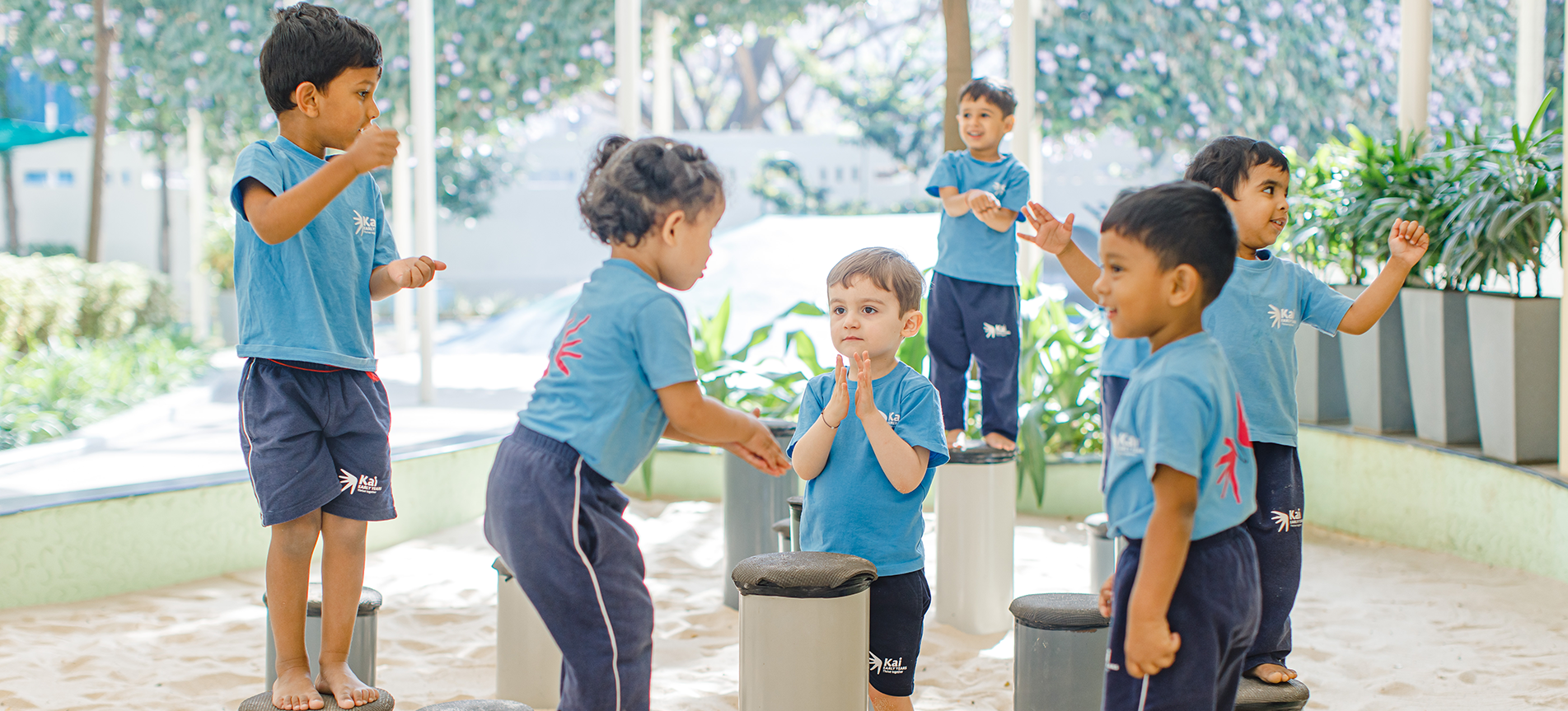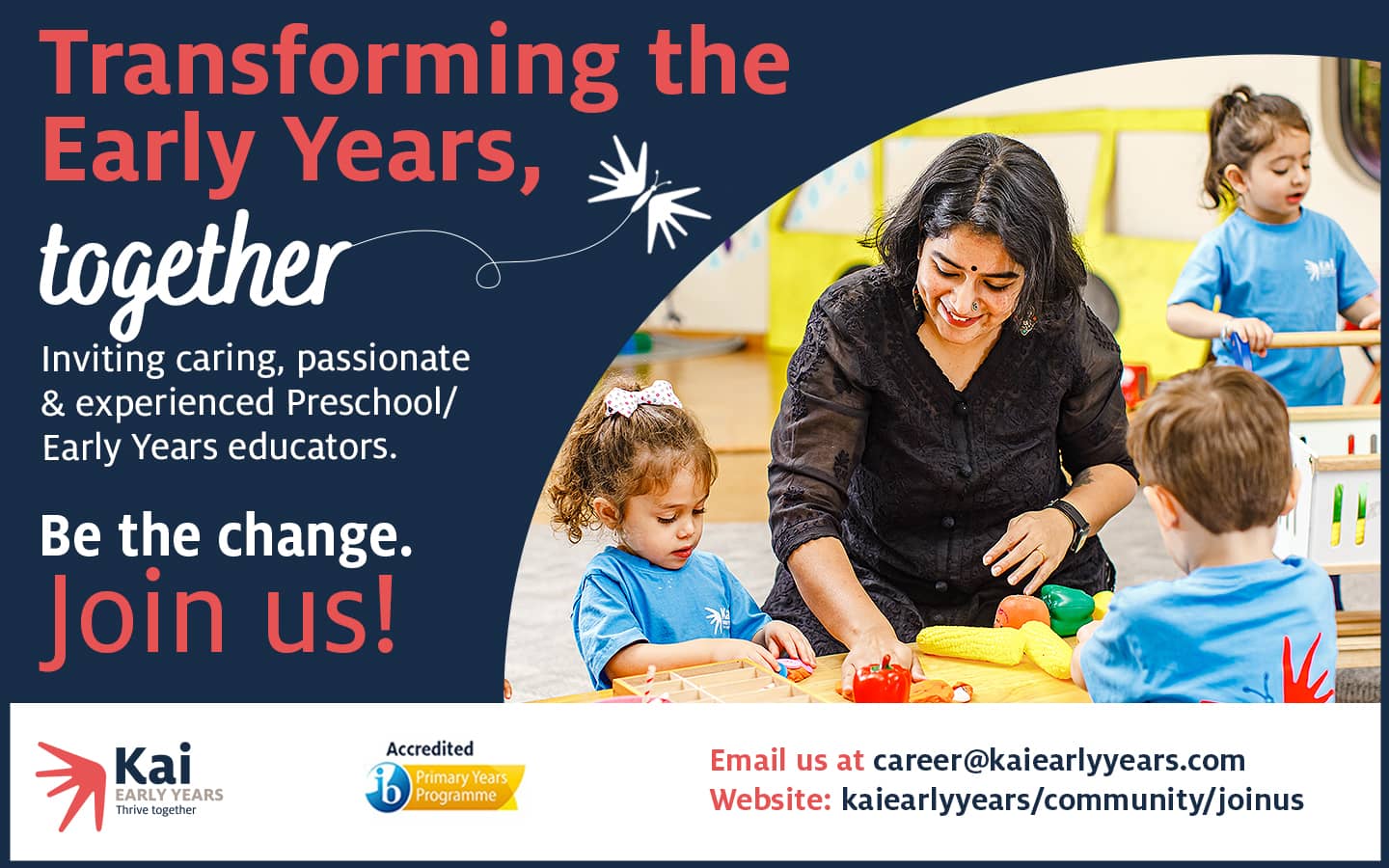Pre – K: Ages 3 – 4 years
Timings: 8:00 am – 2:30 pm (Mondays – Fridays) || Teachers to Students Ratio: 1 : 10
Introduction
Pre-K at Kai is a joyful year of exploration, connection, and emerging curiosity. At this stage, children begin to see themselves as part of a wider world — asking “why” with increasing frequency as they seek to make sense of their surroundings. This natural curiosity is supported through a rich blend of inquiry-based learning and hands-on discovery grounded in both the IB and Montessori approaches.
Children explore big ideas about how people live, work, celebrate, and care for one another and the planet. They begin to form deeper relationships with peers, collaborate in small groups, and share their thoughts more confidently. It’s a time when language, empathy, and independence grow rapidly — and when every question, story, and observation becomes a meaningful entry point into learning. At Kai, Pre-K learners are encouraged to wonder, investigate, and express themselves — laying the foundation for confident, thoughtful inquiry in the years ahead.
The IB Units of Inquiry
Units of Inquiry in Pre-K are built around meaningful, real-world ideas that children can see, touch, and experience. In “Community Helpers,” children learn how different people contribute to our world — from doctors and teachers to bakers and builders — sparking empathy, connection, and respect. In “The Journey of Food from Farm to Table,” they discover where food comes from and explore the systems and people involved in getting it to our plates. “Celebrations Around the World” introduces children to global traditions, helping them understand diversity, ritual, and joy. In “Animal Habitats,” children explore where animals live, what they need, and how we can care for the natural world around us.
To deepen understanding and bring learning to life, children also participate in thoughtfully planned field trips that extend classroom inquiry into the wider world. These experiences help build connections between what they are learning and the community around them, making learning more tangible and memorable.
Across these inquiries, children develop attributes from the IB Learner Profile — becoming inquirers through questioning and exploring, communicators through stories and discussions, and caring, principled individuals through shared routines and responsibilities.
Montessori materials and methods are seamlessly woven into these explorations. Children might sort, wash, and cut real vegetables while learning about food, explore “parts of a plant” puzzles, or learn how to fold cultural clothing while celebrating festivals. They use moveable alphabets, sensorial trays, and real-life tools to make learning tactile and meaningful. The learning environment is designed to offer freedom within structure — allowing children to choose, create, and discover at their own pace while developing concentration, coordination, and a growing sense of self.
This blend of Montessori hands-on learning and IB inquiry ensures that children not only build knowledge — they begin to form values, perspectives, and a genuine sense of their role in the world.
Physical Development
Children build coordination, strength, and agility through outdoor games, movement sessions, and gross motor play. They explore obstacle paths, carry out balancing tasks, and participate in action songs and movement games. Fine motor skills are strengthened through pouring, scooping, threading, and early writing activities, all of which support their growing independence and ability to care for themselves and their environment.
Numeracy
Children develop early math skills through engaging, hands-on activities connected to real-life themes. They explore counting, patterning, sorting, and sequencing during daily routines, building a strong foundation for math understanding. These experiences encourage curiosity and logical thinking, inviting children to ask questions, recognize patterns, and understand relationships in the world around them through playful exploration.
Language Development
This is a year of exciting growth in early literacy. Children build strong language foundations through storytelling, dramatic play, rhymes, group discussions, read-alouds and show and tells. They begin recognizing letters and sounds, connect spoken and written language, and engage in tracing and letter formation. These experiences nurture pre-reading skills and give children the confidence to express themselves using rich vocabulary and storytelling.
Social & Emotional Development
Pre-K is where children truly begin to see themselves as part of a group. They engage in shared tasks like setting up snack tables, planning simple events, or contributing to classroom responsibilities. Group work, celebration of festivals, and collaborative play help children develop empathy, listen to others, and express their feelings respectfully. Through these experiences, they develop a sense of fairness, cooperation, and community.
Creative Development
Imaginative play thrives in Pre-K — from building a model market stall to acting out community celebrations. Children create art with intention, inspired by books, traditions, and personal experiences. Music, dance, storytelling, and outdoor exploration fuel their creativity and give them the freedom to invent, express, and perform. Every child’s voice is celebrated.
Approaches to Learning
Pre- K children are empowered to make choices, ask questions, and take initiative. Teachers guide them to reflect, wonder, and extend their thinking, aligning with the IB’s focus on learner agency and inquiry. Through daily provocations, collaborative projects, and meaningful classroom routines, children begin to develop independence, confidence, and the joy of discovering who they are as learners and individuals. Even at this early stage, experiences like the Student-Led Conference offer children a gentle introduction to sharing their learning with others, helping them build voice, pride, and a sense of accomplishment.
Your child’s day at Kai

